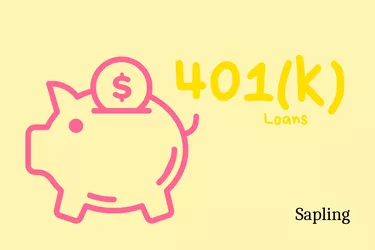
You want to buy a house, and you need a down payment. Or your car just threw a rod, and you need a new vehicle. How do you get that down payment? With a 401(k), you have the option to borrow a certain amount of money. The upside is you have that needed down payment, but what is the downside?
A 401 (k) loan is a way to access your retirement fund early.
Video of the Day
Video of the Day
What Is a 401(k) Loan?
A 401(k) loan is a way to access your retirement fund early. It's not like a traditional loan where you need good credit. You're just borrowing from yourself.
With a 401(k) loan, you can borrow $50,000 or 50 percent of the fund's assets, whichever is less, according to the IRS. Although you're borrowing from yourself, you will still need to pay interest. But the interest is going back into your pocket. You also must repay the loan within five years.
Your plan administrator determines whether you can borrow from the 401(k) plan. So, despite this being your plan, you might not have the funds available. And in some cases, you are prohibited from contributing to the plan while the loan is outstanding.
Fortunately, the loan will not affect your credit score if you default. Remember, this isn't a traditional loan; you are borrowing from yourself. So if you default, it won't be reported to the credit bureau. But there are other repercussions.
Ending Employment Affects Loan
When you take out a 401(k) loan, your repayment is made through automatic employee deductions from your paycheck. So, if you leave your job, you are still required to make payments regardless of the circumstances.
When you're at your original job, you have five years to repay the 401(k) loan. But if you leave employment, whether you're terminated or quit, you must pay off the loan by your next tax return. So if you had a loan and left your job in January, you'd have to repay the loan by April 15, according to the Tax Cuts and Jobs Act (TCJA) of 2017.
Defaulting on a 401(k) Loan
It is considered an early withdrawal if you don't repay your loan for whatever reason. At this point, the balance is regarded as a taxable distribution. It is then subject to taxes and penalties.
Stock Market Affects 401(k) Loan
Since 401(k) plans are invested in stocks, there is an advantage of borrowing from your plan when there is a bear market. This is because if the market is down, you'll be selling your plan's assets at a low cost. Then, most of the time, you'll be paying yourself back at a higher interest rate than you would have earned on the stocks.
Doing this will prevent additional losses of your fund's assets. So, you'll cut your losses while using your money to make that big purchase.
But if the bull is running and you borrow from your plan, you could miss out on stock market gains. This could take money out of your pocket in the long run. Moreover, you might not be able to pay enough interest back to yourself to make up for the loss.
401(k) Loans and Home Buying
If you are buying a home, there are different payback terms. The IRS allows for a longer payback period. This applies if you're purchasing a primary residence. But the IRS doesn't give a definitive time for the payback. It's up to the plan administrator to determine the length of time before the loan must be paid back.
- IRS: Retirement Topics: Plan Loans
- IRS: Retirement Plans FAQs Regarding Loans
- Forbes: How to Get a 401 (k) Loan
- IRS: Be Tax Ready: Understanding Tax Reform Changes Affecting Individuals and Families
- IRS: 401 (k) Fix it guide – Participant Loans Don’t Conform to the Requirements of the Plan Document and IRC Section 72